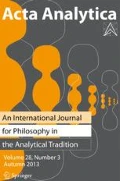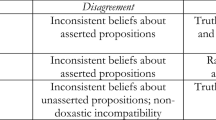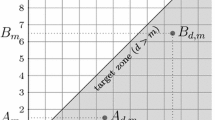Abstract
It is usually claimed that taste utterances have judge-dependent semantic content. Jeremy Wyatt recently proposed a semantic theory that rejects this claim. According to him, the semantic content of taste sentences is judge-independent, but the content of our assertions made by uttering taste sentences is judge-dependent. He showed that this account explains faultless disagreements about tastes. My paper aims to raise some challenges to his proposal. First, a judge-independent taste proposition semantically expressed by a taste sentence seems unrelated to a judge-dependent taste proposition asserted by the speaker. It means that the latter proposition is not systematically obtained from the former. Second, the theory assumes that there are judge-independent taste properties (like being tasty, full stop). The existence of such properties can be questioned because it is problematic to state instantiation conditions for them. The paper ends with a sketch of an alternative explanation; it shares Wyatt’s account of faultless disagreements but does not suffer from its drawbacks.
Similar content being viewed by others
Notes
The idea that disagreements about matters of personal taste can be faultless seems to be less controversial than the idea that disagreements about moral and aesthetic issues can be faultless. If there are facts of ethics and aesthetics “out there,” disagreements in these domains might not be faultless. Nevertheless, there are attempts to show otherwise—see, e.g., Hills (2013) for a theory of faultless moral disagreements and Baker and Robson (2017), McIver Lopes (2017), and Schafer (2011) for theories of faultless aesthetic disagreements.
The labels “faultless intuition” and “disagreement intuition” are Clapp’s (see Clapp 2015, pp. 520–521).
Recently, Raven (2017, p. 169) argued that relativism joins contextualism because it also fails to preserve the disagreement intuition. The same would hold if contextualism and relativism were mere notational variants (see Stojanovic 2007). Independently of the relativism vs. contextualism debate, also Moltmann (2010, pp. 194–195) blamed the former for the failure to explain taste disagreements. MacFarlane (2014, pp. 118–137) defends the view that relativism fares better than contextualism (and other approaches on the market) in explaining taste disagreements.
See, e.g., Barker (2013), Buekens (2011), Gutzmann (2016), Huvenes (2014), López de Sa (2008, 2015), Marques and García-Carpintero (2014), Plunkett and Sundell (2013), Silk (2016), Sundell (2011), and Zouhar (2018). Zeman (2017) summarizes contextualist attempts to preserve the disagreement intuition.
See Baker and Robson (2017), Hills (2013), Schafer (2011), and Wyatt (2018). An interesting addition to this literature is Hirvonen (2016) in which absolutism is defended for the so-called objectivist uses of taste predicates that are based on a folk theory of taste. For criticisms of Schafer (2011), see Eriksson and Tiozzo (2016).
Given that J1 and J2 are judges, J1’s attitude A1 is non-cotenable with J2’s attitude A2 provided J1 could not coherently adopt A2 without changing her mind (and mutatis mutandis for J2) (see MacFarlane 2014, p. 121).
The discussion in this section shows that judge-dependent taste propositions asserted or believed by speakers are not systematically obtained from judge-independent taste propositions that are supposed to be semantically expressed by uttered taste sentences. Interestingly, David Lewis (1980, pp. 93–94) admitted that semantic values and propositional contents of sentences in contexts may come apart, but still insisted that the assignment of the former should determine the assignment of the latter (see Yalcin 2014 for a detailed discussion about the distinction between semantic value and content). Lewis thus required that there must be a systematic relation between semantic value and content. Wyatt’s attempt to combine both judge-dependent and judge-independent taste proposition in a single picture can be described as sinning against an analogous requirement. I am indebted to an anonymous reviewer for the suggestion to frame the present discussion in this way.
Cappelen and Lepore’s version of semantic minimalism differs from Borg’s. It admits that the semantic contents of sentences may vary relative to contexts of utterance provided they contain explicit indexicals; see Cappelen and Lepore (2005).
This holds in ordinary cases in which utterances of “This is tasty” license the so-called acquaintance inference, i.e., the inference from an utterance of “This is tasty” to “The speaker has tasted this” (assuming, of course, that the two occurrences of “this” are co-referential) (see Ninan 2014, p. 292). In ordinary cases, if an utterance of “This is tasty” fails to license the acquaintance inference, the utterance is infelicitous. It should be recognized, however, that there are special uses of “This is tasty” that do not license the acquaintance inference. They include, for example, exocentric uses, uses embedded in conditionals, and uses featuring epistemic modals (see Ninan 2014, p. 299). Furthermore, notice that, in some exceptional situations, one can be entitled to utter “This is tasty, but not to me” (see Anthony 2016, Sc. 2.2 for a detailed discussion). In such cases, Ann’s utterance of “This is tasty” could be true but the proposition that B’s flavor is pleasing to Ann’s tastes would be false. Thanks to an anonymous reviewer for pressing me on this point.
It is sometimes claimed that the business of semanticists is independent of the business of metaphysicians (see, e.g., Cappelen and Lepore 2005, Ch. 11). I disagree. If it turned out that, besides judge-dependent taste properties, there is no judge-independent taste property, an absolutist semantics for taste predicates would be a non-starter. The metaphysics of properties should thus tell us whether taste absolutism can be put on a firm footing.
Two properties of being salty can be distinguished, namely chemical and gustatory. I have in mind here the former property, as objects instantiate it merely on the basis of its chemical composition. The gustatory property of being salty requires an appeal to a judge in the same way as being too salty and being tasty.
It might be admitted that there is more than one ideal judge, but in such a case all ideal judges should make the same decisions about the same flavors.
In fact, the account in Zouhar (2018) is slightly different. It is claimed there that the property of being tasty for someone is nothing but the property of interacting with someone’s gustatory capacities in a way that produces agreeable gustatory experiences of an intrinsically desirable sort. This explication was inspired by Egan’s dispositional account proposed in Egan (2010). It is rather widespread to treat judge-dependent properties as dispositional, modeled on Lewis’s dispositional theory of values from Lewis (1989) (see also Clapp 2015; López de Sa 2017; Marques 2016). My reasons for rejecting the dispositional part are given in Zouhar (2018). Some considerations in Ninan (2014) also can be understood as casting doubts on dispositional accounts of taste properties.
This is a simplified version of the definition from Duží et al. (2010, p. 361).
References
Anthony, A. (2016). Experience, evaluation and faultless disagreement. Inquiry, 59(6), 686–722. https://doi.org/10.1080/0020174X.2016.1208923.
Baker, C., & Robson, J. (2017). An absolutist theory of faultless disagreement in aesthetics. Pacific Philosophical Quarterly, 98(3), 429–448. https://doi.org/10.1111/papq.12102.
Barker, C. (2013). Negotiating taste. Inquiry, 56(2-3), 240–257. https://doi.org/10.1080/0020174X.2013.784482.
Borg, E. (2004). Minimal semantics. Oxford: Oxford University Press. https://doi.org/10.1093/0199270252.001.0001.
Buekens, F. (2011). Faultless disagreement, assertions and the affective-expressive dimension of judgments of taste. Philosophia, 39(4), 637–655. https://doi.org/10.1007/s11406-011-9318-5.
Cappelen, H., & Hawthorne, J. (2009). Relativism and monadic truth. Oxford: Oxford University Press. https://doi.org/10.1093/acprof:oso/9780199560554.001.0001.
Cappelen, H., & Lepore, E. (2005). Insensitive semantics: a defense of semantic minimalism and speech act pluralism. Oxford: Blackwell. https://doi.org/10.1002/9780470755792.
Clapp, L. (2015). A non-alethic approach to faultless disagreement. Dialectica, 69(4), 517–550. https://doi.org/10.1111/1746-8361.12104.
Duží, M., Jespersen, B., & Materna, P. (2010). Procedural semantics for hyperintensional logic: foundations and applications of transparent intensional logic. Dordrecht: Springer. https://doi.org/10.1007/978-90-481-8812-3.
Egan, A. (2010). Disputing about taste. In R. Feldman & T. A. Warfield (Eds.), Disagreement (pp. 247–286). Oxford: Oxford University Press. https://doi.org/10.1093/acprof:oso/9780199226078.003.0011.
Egan, A. (2014). There’s something funny about comedy: a case study in faultless disagreement. Erkenntnis, 79(Supplement 1), 73–100. https://doi.org/10.1007/s10670-013-9446-3.
Eriksson, J., & Tiozzo, M. (2016). Matters of ambiguity: faultless disagreement, relativism, and realism. Philosophical Studies, 173(6), 1517–1536. https://doi.org/10.1007/s11098-015-0561-7.
Glanzberg, M. (2007). Context, content, and relativism. Philosophical Studies, 136(1), 1–29. https://doi.org/10.1007/s11098-007-9145-5.
Grice, P. (1989). Logic and conversation. In Studies in the way of words (pp. 22–40). Cambridge, MA: Harvard University Press.
Gutzmann, D. (2016). In C. Meier & J. van Wijnberger-Huitink (Eds.), If expressivism is fun, go for it In Subjective meaning: alternatives to relativism (pp. 21–46). Berlin: de Gruyter.
Hills, A. (2013). Faultless moral disagreement. Ratio, 26(4), 410–427. https://doi.org/10.1111/rati.12034.
Hirvonen, S. (2016). Doing without judge dependence. In C. Meier & J. van Wijnberger-Huitink (Eds.), Subjective meaning: alternatives to relativism (pp. 47–68). Berlin: de Gruyter.
Huvenes, T. T. (2014). Disagreement without error. Erkenntnis, 79(Supplement 1), 143–154. https://doi.org/10.1007/s10670-013-9449-0.
Kölbel, M. (2002). Truth without objectivity. London & New York: Routledge.
Kölbel, M. (2004). Faultless disagreement. Proceedings of the Aristotelian Society, 104, 53–73. https://doi.org/10.1111/j.0066-7373.2004.00081.x.
Lasersohn, P. (2005). Context dependence, disagreement, and predicates of personal taste. Linguistics and Philosophy, 28(6), 643–686. https://doi.org/10.1007/s10988-005-0596-x.
Lewis, D. (1980). Index, context, and content. In S. Kanger & S. Öhman (Eds.), Philosophy and grammar (pp. 79–100). Amsterdam: D. Reidel Publishing Company. https://doi.org/10.1007/978-94-009-9012-8_6.
Lewis, D. (1989). Dispositional theories of value. Proceedings of the Aristotelian Society, 63, 113–138. https://doi.org/10.1017/CBO9780511625114.008.
López de Sa, D. (2008). Presuppositions of commonality: an indexical relativist account of disagreement. In M. García-Carpintero & M. Kölbel (Eds.), Relative truth (pp. 297–310). Oxford: Oxford University Press. https://doi.org/10.1093/acprof:oso/9780199234950.003.0014.
López de Sa, D. (2015). Expressing disagreement: a presuppositional indexical contextualist relativist account. Erkenntnis, 80(Supplement 1), 153–165. https://doi.org/10.1007/s10670-014-9664-3.
López de Sa, D. (2017). Making beautiful truths. In J. O. Young (Ed.), Semantics of aesthetic judgements (pp. 38–60). Oxford: Oxford University Press. https://doi.org/10.1093/acprof:oso/9780198714590.003.0003.
MacFarlane, J. (2005). Making sense of relative truth. Proceedings of the Aristotelian Society, 105, 321–339. https://doi.org/10.1111/j.0066-7373.2004.00116.x.
MacFarlane, J. (2014). Assessment sensitivity: relative truth and its applications. Oxford: Oxford University Press. https://doi.org/10.1093/acprof:oso/9780199682751.001.0001.
Marques, T. (2016). Aesthetic predicates: a hybrid dispositional account. Inquiry, 59(6), 723–751. https://doi.org/10.1080/0020174X.2016.1192484.
Marques, T., & García-Carpintero, M. (2014). Disagreement about taste: commonality presuppositions and coordination. Australasian Journal of Philosophy, 92(4), 701–723. https://doi.org/10.1080/00048402.2014.922592.
McIver Lopes, D. (2017). Disputing taste. In J. O. Young (Ed.), Semantics of aesthetic judgements (pp. 61–81). Oxford: Oxford University Press. https://doi.org/10.1093/acprof:oso/9780198714590.003.0004.
Moltmann, F. (2010). Relative truth and the first person. Philosophical Studies, 150(2), 187–220. https://doi.org/10.1007/s11098-009-9383-9.
Ninan, D. (2014). Taste predicates and the acquaintance inference. Proceedings of SALT, 24, 290–309. https://doi.org/10.3765/salt.v24i0.2413.
Plunkett, D., & Sundell, T. (2013). Disagreement and the semantics of normative and evaluative terms. Philosopher’s Imprint, 13(23) http://hdl.handle.net/2027/spo.3521354.0013.023.
Raven, M. J. (2017). Against the semantic orientation towards aesthetic judgement. In J. O. Young (Ed.), Semantics of aesthetic judgements (pp. 160–184). Oxford: Oxford University Press. https://doi.org/10.1093/acprof:oso/9780198714590.003.0009.
Recanati, F. (2003). Literal meaning. Cambridge: Cambridge University Press. https://doi.org/10.1017/CBO9780511615382.
Recanati, F. (2007). Perspectival thought: a plea for (moderate) relativism. Oxford: Oxford University Press. https://doi.org/10.1093/acprof:oso/9780199230532.001.0001.
Richard, M. (2008). When truth gives out. Oxford: Oxford University Press. https://doi.org/10.1093/acprof:oso/9780199239955.001.0001.
Schafer, K. (2011). Faultless disagreement and aesthetic realism. Philosophy and Phenomenological Research, 82(2), 265–286. https://doi.org/10.1111/j.1933-1592.2010.00391.x.
Silk, A. (2016). Discourse contextualism: a framework for contextualist semantics and pragmatics. Oxford: Oxford University Press. https://doi.org/10.1093/acprof:oso/9780198783923.001.0001.
Stephenson, T. (2007). Judge dependence, epistemic modals, and predicates of personal taste. Linguistics and Philosophy, 30(4), 487–525. https://doi.org/10.1007/s10988-008-9023-4.
Stojanovic, I. (2007). Talking about taste: disagreement, implicit arguments, and relative truth. Linguistics and Philosophy, 30(6), 691–706. https://doi.org/10.1007/s10988-008-9030-5.
Sundell, T. (2011). Disagreements about taste. Philosophical Studies, 155(2), 267–288. https://doi.org/10.1007/s11098-010-9572-6.
Wright, C. (1992). Truth and objectivity. Cambridge, Mass.: Harvard University Press.
Wright, C. (2008). Relativism about truth itself: haphazard thoughts about the very idea. In M. García-Carpintero & M. Kölbel (Eds.), Relative truth (pp. 157–185). Oxford: Oxford University Press. https://doi.org/10.1093/acprof:oso/9780199234950.003.0007.
Wyatt, J. (2018). Absolutely tasty: an examination of predicates of personal taste and faultless disagreement. Inquiry, 61(3), 252–280. https://doi.org/10.1080/0020174X.2017.1402700.
Yalcin, S. (2014). Semantics and metasemantics in the context of generative grammar. In A. Burgess & B. Sherman (Eds.), Metasemantics: new essays on the foundations of meaning (pp. 17–54). Oxford: Oxford University Press. https://doi.org/10.1093/acprof:oso/9780199669592.003.0002.
Zeman, D. (2017). Contextualist answers to the challenge from disagreement. Phenomenology and Mind, 12, 62–73. https://doi.org/10.13128/Phe_Mi-21106.
Zouhar, M. (2018). Conversations about taste, contextualism, and non-doxastic attitudes. Philosophical Papers,47(3), 429–460. https://doi.org/10.1080/05568641.2018.1450159.
Acknowledgments
I am indebted to an anonymous reviewer for Acta Analytica for her or his criticisms and useful suggestions.
Author information
Authors and Affiliations
Corresponding author
Ethics declarations
Conflict of Interest
The author declares that she has no conflict of interest.
Additional information
Publisher’s Note
Springer Nature remains neutral with regard to jurisdictional claims in published maps and institutional affiliations.
Rights and permissions
About this article
Cite this article
Zouhar, M. Absolutism About Taste and Faultless Disagreement. Acta Anal 35, 273–288 (2020). https://doi.org/10.1007/s12136-019-00409-w
Received:
Accepted:
Published:
Issue Date:
DOI: https://doi.org/10.1007/s12136-019-00409-w




